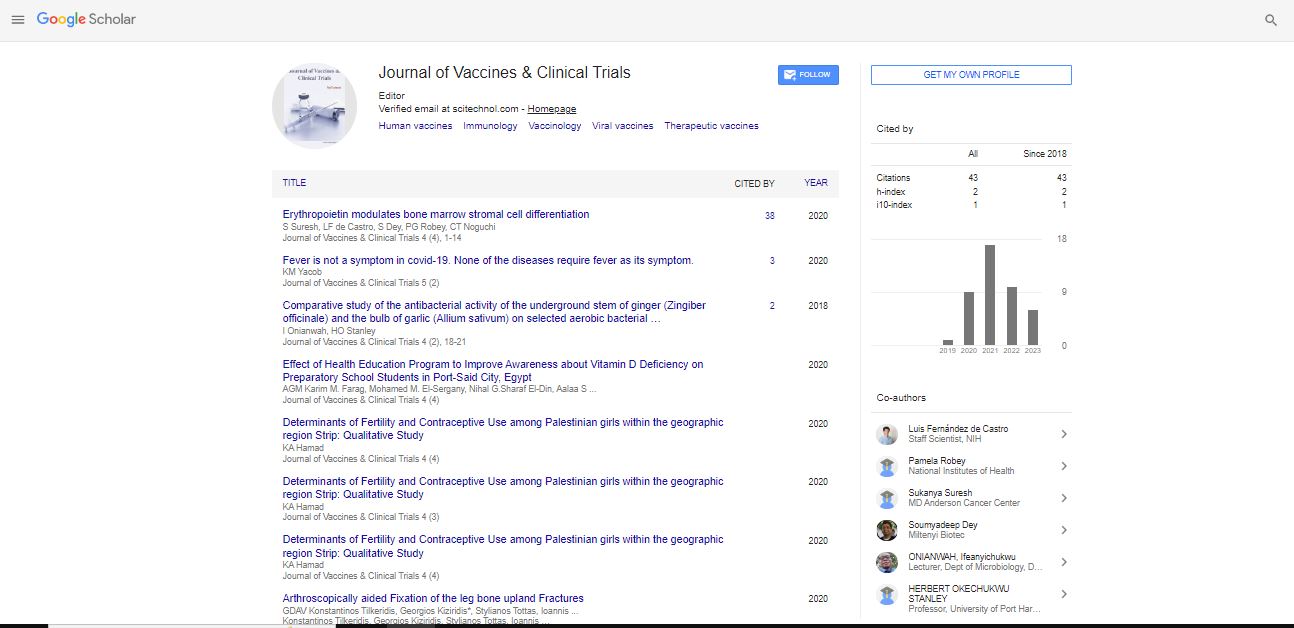Commentary, Jou Of Vac Cli Tr Vol: 7 Issue: 4
Cholera: A Historical Review, Epidemiology and Management
Shaima Shandari*
1Department of Clinical trials, Sultan Qaboos University, Muscat, Oman
*Corresponding Author: Shaima Shandari,
Department of Clinical trials, Sultan
Qaboos University, Muscat, Oman
E-mail: shandarishandari@squ.edu.om
Received date: 27 November, 2023, Manuscript No. JVCT-24-128356;
Editor assigned date: 30 November, 2023, PreQC No. JVCT-24-128356 (PQ);
Reviewed date: 07 December, 2023, QC No. JVCT-24-128356;
Revised date: 21 December, 2023, Manuscript No. JVCT-24-128356 (R);
Published date: 28 December, 2023 DOI: 10.4172/JVCT.100086
Citation: Shandari S (2023) A Historical Review, Epidemiology and Management of Cholera. Jou of Vac Cli Tr 7:4.
Description
Cholera, a waterborne disease caused by the bacterium Vibrio cholerae, has left an indelible mark on human history. Its existence dates back centuries, with documented outbreaks across continents.
The history of cholera is a tapestry woven with suffering, fear, and scientific breakthroughs. It first gained international attention in the early 19th century, emerging as a pandemic disease that traversed continents through trade routes and population movements. The devastating impact of cholera on societies, particularly in densely populated areas with poor sanitation, led to widespread panic and social upheaval.
One of the most infamous pandemics was the 19th-century cholera pandemic that originated in the Indian subcontinent and spread globally, reaching Europe, North America, and beyond. This pandemic highlighted the importance of understanding the disease's transmission, leading to pivotal discoveries by pioneers like John Snow, who traced a London outbreak to a contaminated water pump, pioneering the field of epidemiology.
Cholera continues to pose a significant global health challenge, particularly in regions with inadequate sanitation and limited access to clean water. While advances in sanitation and healthcare have curbed its prevalence in many parts of the world, outbreaks persist in vulnerable populations, conflict zones, and areas struck by natural disasters.
The bacterium Vibrio cholerae exists in two main serogroups, O1 and O139, with the former causing the majority of outbreaks. Transmission occurs primarily through the consumption of contaminated water or food, especially in settings with poor hygiene. The infection's rapid onset and potential for explosive outbreaks make it a formidable public health concern.
Upon ingestion, V. cholerae colonizes the small intestine, where it releases cholera toxin. This potent toxin induces profuse diarrhea by activating adenylate cyclase in the intestinal epithelium, leading to the secretion of large volumes of electrolytes and water into the gut lumen. The resulting dehydration and electrolyte imbalance can rapidly progress to severe dehydration, electrolyte disturbances, and, if left untreated, death.
Cholera often presents with sudden, severe watery diarrhea, commonly described as "rice water stool" due to its appearance. Patients rapidly lose fluids, leading to dehydration, electrolyte imbalances, and potentially life-threatening complications such as hypovolemic shock. Other symptoms may include vomiting, muscle cramps, and a rapid heart rate.
Timely intervention is crucial in managing cholera. Rehydration therapy, either orally or intravenously, is the cornerstone of treatment. Oral rehydration solutions containing a precise balance of glucose and electrolytes help replace lost fluids and salts. In severe cases, intravenous fluids and antibiotics like doxycycline or azithromycin may be necessary.
Preventing cholera hinges on improving sanitation, ensuring access to clean water, and promoting hygiene practices. Vaccines, such as the oral cholera vaccine, are also valuable tools in controlling outbreaks and protecting vulnerable populations.
Cholera's legacy encompasses not just its historical impact but also the on-going challenges it presents to global public health. While advancements in healthcare and sanitation have mitigated its effects in many regions, it remains a persistent threat, especially in areas grappling with poverty, conflict, and inadequate infrastructure.
Understanding the epidemiology, pathogenesis, and clinical management of cholera is pivotal in preventing and controlling outbreaks. Collaborative efforts involving governments, healthcare agencies, and communities are essential in ensuring access to clean water, sanitation facilities, and healthcare services, ultimately striving toward a cholera-free world.
 Spanish
Spanish  Chinese
Chinese  Russian
Russian  German
German  French
French  Japanese
Japanese  Portuguese
Portuguese  Hindi
Hindi 